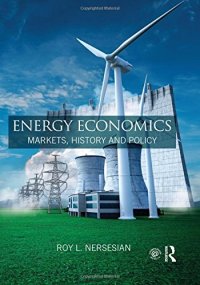
Ebook: Energy Economics: Markets, History and Policy
Author: Roy L. Nersesian
- Tags: Environmental Economics, Economics, Business & Money, Energy Production & Extraction, Alternative & Renewable, Drilling Procedures, Electric, Fossil Fuels, Mining, Nuclear, Power Systems, Engineering, Engineering & Transportation, Technology, Science & Math, Business & Finance, Accounting, Banking, Business Communication, Business Development, Business Ethics, Business Law, Economics, Entrepreneurship, Finance, Human Resources, International Business, Investments & Securities, Management, Marketing, Real Estate, Sales, New Us
- Year: 2016
- Publisher: Routledge
- Language: English
- epub
Three quarters of our current electricity usage and transport methods are derived from fossil fuels and yet within two centuries these resources will dry up. Energy Economics covers the role of each fossil and renewable energy source in today’s world, providing the information and tools that will enable students to understand the finite nature of fossil fuels and the alternative solutions that are available.
This textbook provides detailed examinations of key energy sources – both fossil fuels and renewables including oil, coal, solar, and wind power – and summarises how the current economics of energy evolved. Subsequent chapters explore issues around policy, technology and the possible future for each type of energy. In addition to this, readers are introduced to controversial topics including fracking and global warming in dedicated chapters on climate change and sustainability.
Each chapter concludes with a series of tasks, providing example problems and projects in order to further explore the proposed issues. An accompanying companion website contains extensive additional material on the history of the major types of fuel as well as technical material relating to oil exploration, the development of solar power and historical environmental legislation.
This textbook is an essential text for those who study energy economics, resource economics or energy policy.